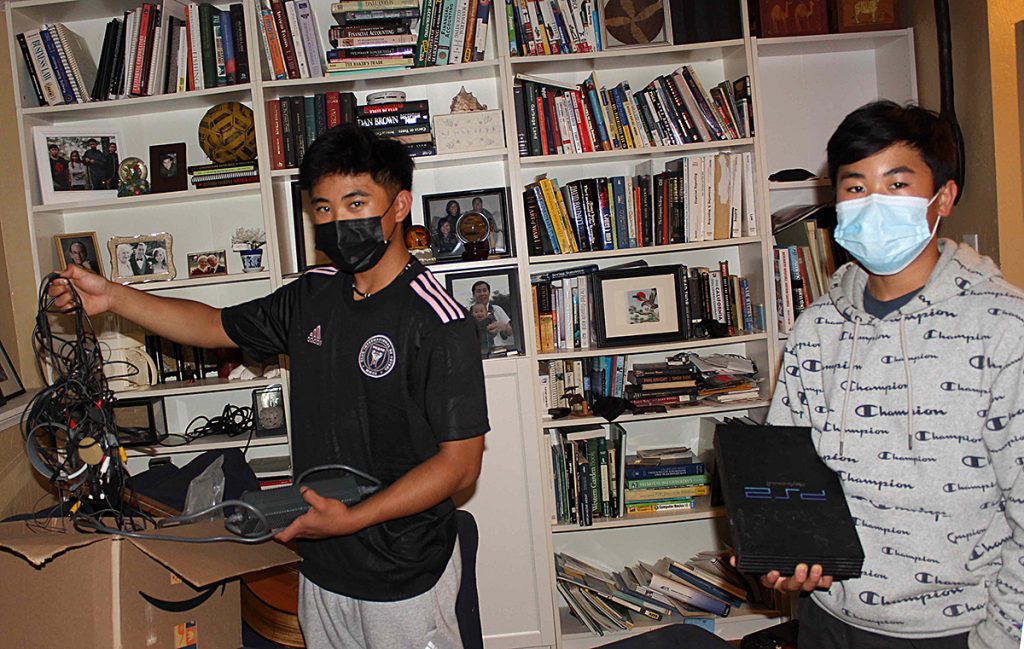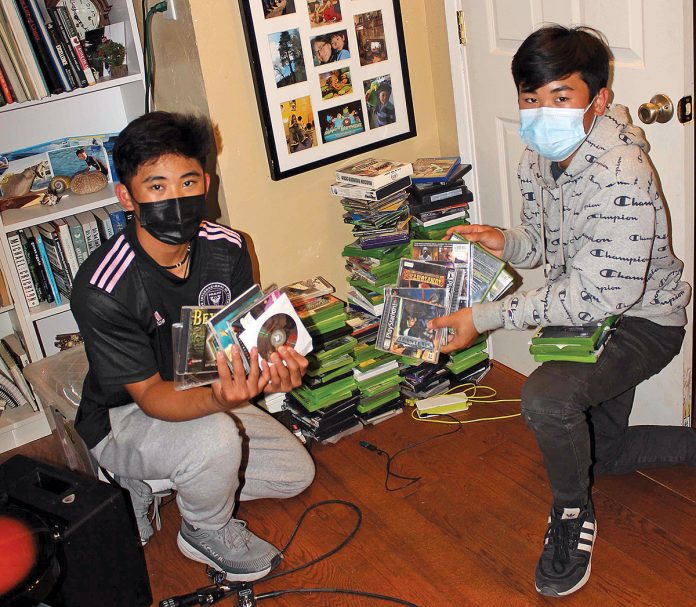There was a time when “Call of Duty: Black Ops,” “Forza Horizon” and “Halo 3” all got regular rotations in the Schneider brothers’ Xbox 360.
But by the time Andrew had turned 13 and Ethan hit 15 they’d moved on to newer games and other activities.
“Back then everybody played CD games,” Ethan said. “Nowadays it’s more of a shift to online downloads of games like ‘Fortnite.’”
Their parents weren’t too keen on the growing pile of rarely-opened cartridges occupying the floor in front of the TV. They served the boys with an ultimatum: clean up or get rid of them.
The residents of Old Summit Road considered taking a load to GameStop, but knew they wouldn’t be offered much money for their haul. They asked if friends wanted preloved games, but they already had enough. Then, a lightbulb went off in Ethan’s head.
“I thought the best option to use them is to donate it,” he said.
“We had the idea, maybe we could make our own nonprofit and give it to the people in Africa,” Andrew said.
The concept was partly inspired by a trip they’d taken to rural areas of the Philippines. They couldn’t help but notice how a lot of the people there hadn’t known the joy of playing “Rayman Legends” or “Skylanders: Giants.” Many didn’t seem to have any electronics whatsoever.
“A lot of people there don’t actually have access to the internet or computers,” Ethan said. “They lived in straw huts. They had houses made of sheet metal.”
But, since their dad co-founded a company that distributes solar panels in Kenya, they knew more and more communities in Africa are gaining access to electricity.
Ethan felt like there could be a way to let disadvantaged youth on the other side of the world have the same moments of gaming bliss they’d enjoyed.
“I thought it could be a pretty big thing if I’m able to get the right people involved,” he said. “I was encouraged a lot by everyone I told the idea to.”
They called their project Games for the Globe and even managed to get 501(c)(3) status for their charity, which allows them to give tax-deductible receipts to people who donate money.
Andrew was psyched about the plan, especially after their dad put them in contact with Belgian tech-focused NGO Close the Gap.
“If you give it to Goodwill you don’t really know where it goes,” Andrew said, explaining what it’s like to be hands-on with the project. “We know where it goes, who we give it to and who it impacts.”
Michael, their dad, says he may have played a part, but he wasn’t driving the effort.
“They did all of the designing of the website, and the logo, and the name,” he said. “There’s just so much unused stuff around, so I think it’s a great idea.”
To figure out how to make it all work, Ethan thought back to a shopping trip to Sports Basement in Campbell. That store had a box out front for accepting shoes to send to Africa.
“I was inspired by that, at first, for the method of collecting donations,” he said. “The first thing I did was buy a donation bin.”
Next, he reached out to the Summit Store to see if they’d let him put the receptacle on their property. They OK’d it.
“We only received, like, five games the first month,” Ethan said. “We almost gave up because of it, because we didn’t want to inconvenience the store owner.”

It was Andrew’s idea to reach out to a community newspaper—the Mountain News Network—which he knew sometimes lets residents write articles.
When they published a story about Games for the Globe, their intercontinental video game adventure gained steam.
“I actually got some friends who recognized me from it at school,” Ethan said, adding when they checked the donation bin the following week it was completely full. “We were really excited at that point.”
He says he understands why people might’ve been skeptical at first.
“I think at first people didn’t want to donate because (they thought) we weren’t a worthy source,” he said. “You don’t want to help out the wrong people.”
But he explains they worked hard to cross all the t’s and dot all the i’s.
Ethan took some of the lessons he’d learned from developing an app with a couple of data scientists he met in San Jose one time while selling his bike via Craigslist, and put that into the website he created: gamesfortheglobe.org.
Andrew came up with a list of survey questions their nonprofit partners passed along to community leaders in Kenya, to better understand the needs of the people they wanted to help.
“I wrote pretty basic questions: Does your community have access to the internet? … If they’ve been given videogames, before us? If they want it, too,” Andrew said. “The person we were working with in Kenya said it was a pretty good list.”
Andrew says one of the main suggestions they received had to do with making a distinction between educational games, adventure games and games that have gruesome or warfare-related content. Ethan says he appreciated this feedback.
“We definitely thought education was what they needed,” he said. “Everything else is just entertainment, but it can still teach kids about technology in a place where they don’t have a lot of things.”
Within a few weeks, the stream of donations arriving at the Summit Store had slowed. The Schneiders figured they might’ve already received most of the old games the folks in their neighborhood were willing to pass along.
So, they started to cast a wider net, hoping to move their bin to the front of a place like Safeway, CVS or Lunardi’s.
But when Ethan cold-called the corporate stores, he says they were hesitant to take a chance on a charity started by the teenagers—even though they have official charity status.
So, Ethan shifted approaches, reaching out to Scotts Valley Market, since it’s more of a mom-and-pop operation. After a bit of persistence, he was able to get a manager to agree to give them a chance.
Down at the Scotts Valley Market, manager Victor Yanez shakes the donation bid to see what’s inside. There’s not much—yet.
“I think it’s a great idea,” he said of the Schneiders’ project. “I personally never play games. But my kids do.”
He says he hopes the Schneider brothers have a lot of success.
And he points to one big reason local residents may decide to contribute their old video games and consoles—“That’s a good feeling in your heart,” he said.
It’s been about a year since the Schneider brothers started their IRL video game quest. Ethan’s 16, about to start his junior year at Los Gatos High School. Andrew, now 14, finished his last year at CT English Middle School and is looking forward to joining his brother down the hill.
They’ve had some early triumphs with the charity—receiving around 500 games, plenty of controllers and at least 10 consoles, including a Wii, an Xbox, as well as multiple Play Station 1s and 2s.
They’ve realized it’s easier to get games than consoles and say they hope other people will search for older models gathering dust in their basements they’re willing to part with.
“I check to see if the controllers work, the consoles work,” Andrew said. “I check to see if the CDs are in their case. I clean it.”
They just sent off their first shipment via USPS—with Close the Gap picking up the shipping tab. They’re now waiting nervously as the games make their way across the ocean.
“I’m looking forward to seeing the reactions,” Andrew said.
“We were going to go to Africa next summer and I was really hoping to see everything we gave to them and see what it’s being used for,” Ethan said. “Because that will show what we’re working for.”
Follow @gamesfortheglobe on Instagram.









